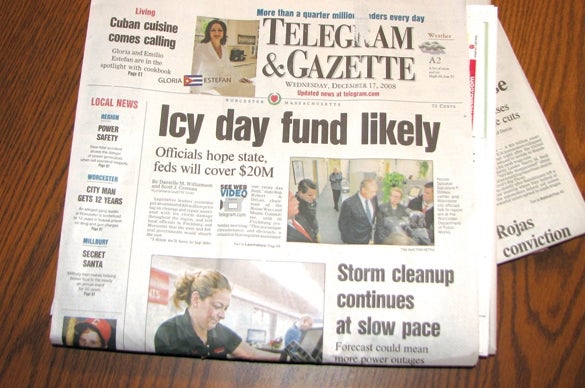Today is a tough time for any business, but it’s extremely tough for major metropolitan dailies.
Speculation is rampant over what daily paper will be the next to fold. Adding fuel to that fire was recent news that the New York Times Co. has threatened to shut down the Boston Globe if its unions — which represent 700 employees — don’t make $20 million in concessions.
But even among all the speculation over the fate of the Globe, there was little mention of the New York Times’ other major Massachusetts daily: the Worcester Telegram & Gazette.
The good news is things aren’t necessarily as dire for the T&G as they are for Globe. The bad news is, the paper has been on a steady revenue decline since 2004.
Despite a poor economy and declining advertising, the New York Times has not told the T&G’s union management that it will have to make major cuts or face the possibility of closure, according to Tim Schiff, the union representative for the Worcester paper’s 200 editorial and circulation workers. “We have had no communications with the company indicating that there’s any problem with the Telegram,” Schiff said.
Bruce Gaultney, publisher of the Worcester Telegram & Gazette, declined to comment on the issue and Catherine Mathis, spokesman for the New York Times Co. said, “We do not comment on our labor negotiations.”
Of course, the situation could change. The T&G and the union, the Commun-ications Workers of America Local 31041, was expected to meet on April 9 for ongoing contract talks. The union has been negotiating the contract with T&G officials since August 2007, when the contract expired, Shiff said. While Schiff doesn’t have many specifics as to why the T&G would be in better financial shape than the Boston Globe, the union has been told the two papers have different economic bases.
Analyst reports seem to bear out Shiff’s impression. An April report on the New York Times Co. compiled by Craig Huber, a media analyst with Barclays Capital, estimates that the Globe will lose $3.5 million in 2010 before taxes and other costs. The T&G, by contrast, is estimated to make $4.5 million with a profit margin of 7 percent. The company’s total news operations, however, are projected to make $222.5 million before taxes.
Historically, both the Globe and T&G were profitable, according to Huber’s report. The Globe had a profit margin above 20 percent until 2000. Its margin held on into the double digits until 2007. Meanwhile, the T&G’s profit margin held in the 20s for longer, hitting a high of 27.3 percent in 2004.
Huber has estimated the value of the Globe and the T&G to be $113 million and $17.3 million respectively. That’s a steep drop from the $1.1 billion it paid for the Globe and the $296 million it paid for the T&G.
Huber’s report illustrates the T&G’s steady revenue decline starting in 2004. That year, the T&G’s revenue was $107 million. After that point, revenues at the paper have slid, dropping 24.3 percent to $81 million in 2008.
The Globe’s revenue in 2005 was $572.3 million, compared to $593.6 million in 2004. It dropped to $538 million in 2006, and then to $442.6 million in 2008.
Same Fate?
Boston University Professor Lou Ureneck said he isn’t familiar with the T&G’s financial details, but he has been following the two New England papers in general.
“I think they’re in the same boat. They’re part of the same media company; and they’ve been managed as a single unit. While there might be somewhat different challenges and distinctions between the two, the same dynamics are at work,” he said. The T&G must now try to maintain advertising and revenue amid a deep recession and a drift toward low-margin Internet advertising, he added.
Edward Atorino, a media analyst with The Benchmark Co., also thinks the T&G is likely in a similar situation as the Globe.
“Things are not that great. It may not have the cost structure of the Globe, it’s a different kind of market, but once the New York Times is done with the Globe, they’ll be knocking on (Worcester’s) door. The handwriting is on the wall,” he said.
With so much upheaval in the media world, local officials in the Worcester area are pulling for the T&G’s survival.
“I think it would be enormous blow to the city and the region if the Telegram were to be no more. It’s a major source of location information. My hope is that we don’t have to face that,” said U.S. Congressman James McGovern, D-Worcester.
Worcester Mayor Konstantina Lukes can’t picture the city without its daily paper. “Without that daily access to news or investigative reports, I think it would be a major blow to our democracy. A daily paper is more than tradition, it’s part of the foundation of our democracy,” she said.

